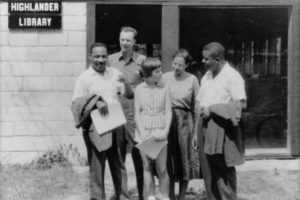
Civil-rights activists at the Highlander Folk School in Grundy County, Tennessee, 1957. Martin Luther King, then 28, had studied there. With him are folksinger Pete Seeger; Charis Horton, daughter of Highlander founder Myles Horton; legendary activist Rosa Parks; and Ralph Abernathy, future president of the Southern Christian Leadership Conference. Four years later, the Highlander Center moved to Knoxville, where it remained for about 10 years. It’s now located near New Market. Photo courtesy of the Highlander Research and Education Center.
Dr. King inspired his supporters here in 1960, but Knoxville’s civil rights effort began many years earlier.
Martin Luther King Jr. spoke in Knoxville on Memorial Day, 1960, as the commencement speaker at Knoxville College. At the time, he was the 31-year-old co-pastor of the Ebenezer Baptist Church in Atlanta, only becoming nationally famous. His visit had a galvanizing effect on local activists, and had an effect on the morale of participants in sit-ins that summer. However, the civil-rights struggle in Knoxville began at least a century earlier.
Tennessee blacks earned the right to vote shortly after the Civil War, in 1867. When political tides shifted, things got worse. Statewide “Jim Crow” laws introduced years after the Civil War legally enforced segregation. Black Knoxville attorney William Yardley (1844-1924) was Knoxville’s first black justice of the peace, founder of the city’s first black newspaper, and the first black man to run for governor of the state, in 1876. He became one of our first civil-rights activists when he attacked practices unfair to blacks and other poor people.
In 1905, when the city first segregated its popular streetcar lines, it resulted in a black boycott of the system. It lasted only a few days, without success; for most working people, using the streetcar was a necessity.
In 1919, the National Association for the Advancement of Colored People, formed in New York 10 years earlier, organized a Knoxville chapter. It looked into unequal treatment of blacks and whites, specifically protesting the fact that black women had far inferior restroom facilities on Market Square.
The NAACP also tried to desegregate the University of Tennessee. Six black men tried, and failed, to enroll at UT in 1939. An effort in 1951 to enroll at UT’s graduate schools was more successful, and under the pressure of a federal lawsuit, four black students were accepted to law
and other graduate schools.
When King spoke in Knoxville on the subject “It’s a Great Time to Be Alive,” he told the Knoxville College crowd, in the thousands: “We’re on the threshold of the most constructive period in history with regard to race relations. I’m convinced that segregation is on its death bed and the only thing uncertain is the day it will be buried.” He added a warning. “The temptation, for those of us who have been trampled on, is to enter the new age with hate and revenge in mind. If we do that, the new order will be nothing more than a duplication of the old.”
Bob Booker, a KC alumnus, witnessed King’s speech. Six years later, he became the first Knoxville black to serve in the state legislature. King’s visit may have emboldened many students who heard it. Demonstrations and sit-ins at previously segregated lunch counters and movie theaters downtown had a positive effect. Some demonstrations received national press coverage.
A book, Diary of a Sit-In (1962), by participant Merrill Proudfoot, is an unusual documentation of the Knoxville demonstrations.
Some restaurants began serving blacks in 1960, within a few weeks of the first sit-ins. Others were more stubborn. Movie theaters remained segregated until 1963.
UT first admitted black undergraduates in 1961. The first black students were Theotis Robinson, who would later be elected the first black city councilman since 1912; and Jimmie Baxter, who was later elected the first black president of the student government association. Baxter later became a U.S. attorney.
Meanwhile, Knoxville and Knoxvillians were playing a role in other ways. Knoxvillan Avon Rollins co-founded the Student Non-Violent Coordinating Committee, and worked with King and many other leaders in the Deep South.
In 1961, the Highlander Folk School, which had already made a major mark on the movement through its training of civil-rights demonstrators like King and Rosa Parks, moved its headquarters from rural southeastern Tennessee to Riverside Drive, on the east side of downtown Knoxville. In the 1960s, civil-rights leaders from Stokely Carmichael to Julian Bond came to study and teach at Highlander.







Leave a reply